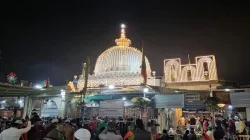Ajmer Dargah row: Muslim bodies in Jaipur appeal to SC to prevent tampering with religious sites
Muslim organisations in Jaipur have appealed to the Supreme Court to prevent surveys and tampering with religious sites, particularly the Ajmer Sharif Dargah, and uphold the Places of Worship Act, 1991.

Muslim organisations in Jaipur have appealed to the Supreme Court to intervene and prevent attempts to "tamper" with the Ajmer Sharif Dargah and other religious places, urging the court to maintain the status quo of mosques and bar any surveys of these religious sites.
The appeal, made on Monday, comes in response to legal petitions that have been filed, claiming that temples once existed at the locations of certain mosques. These organisations expressed concern that such efforts were an attempt to alter the religious and historical significance of these sites, particularly the Ajmer Sharif Dargah, a revered shrine of the Sufi saint Khwaja Moinuddin Chishti.
Mohammad Nazimuddin, the convenor of the joint committee Tahaffuz-e-Auqaf, which represents various Muslim groups, said in a statement, "An attempt is being made to end the status quo of mosques in the name of surveys by filing false court cases claiming temples existed at mosque sites." He further called for the Supreme Court to step in and prevent the tampering with sacred sites, specifically the Ajmer Dargah.
Syed Saadat Ali, an advocate and state president of the Association for Protection of Civil Rights, expressed alarm over a lower court's decision to entertain a petition claiming that a Shiva temple had once existed at the site of the Ajmer Dargah. He argued that such a move is not only troubling but also goes against the principles enshrined in the Constitution. "It is against the Constitution to entertain such petitions that seek to change the status quo of religious places," he stated.
Jameel Khan, the AIMIM’s Rajasthan unit chief, added that the Ajmer Dargah is a symbol of religious unity in India and emphasised the importance of upholding the Places of Worship (Special Provisions) Act, 1991, which prohibits the conversion of the religious character of any place of worship. Khan urged the Supreme Court to dismiss these petitions, which he believes are being filed to create unnecessary tension and disrupt the communal harmony in the country.
The Muslim organisations’ appeal comes at a time when tensions surrounding religious sites are escalating, with concerns about the impact of such petitions on India's pluralistic fabric. The groups are asking the Supreme Court to ensure that the Places of Worship Act is fully respected and that lower courts refrain from hearing petitions that seek surveys or attempts to alter the religious status of these important sites.
(PTI inputs)